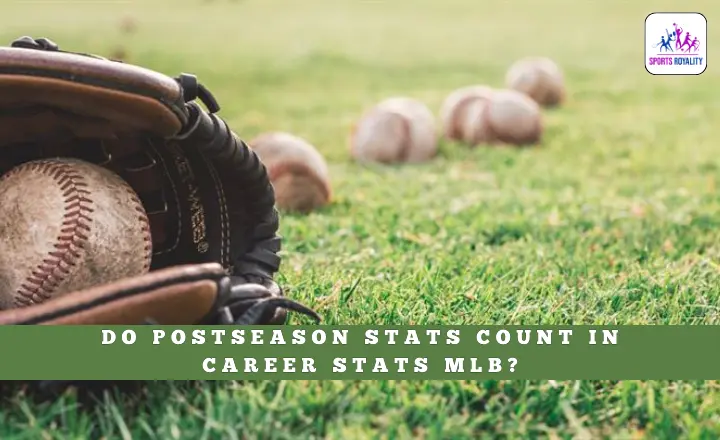Have you ever wondered do postseason stats count in career stats MLB? It’s a question that has sparked countless debates among fans and analysts alike. While some argue that the pressure and intensity of the postseason make these stats even more valuable, others believe that regular season performance should be the sole determinant of a player’s career success.
In this article, we will delve into the arguments on both sides of the coin to determine whether these heroics genuinely deserve a place in the hallowed halls of baseball history.
Do Postseason Stats Count in Career Stats MLB? – Regular Season
The regular season in Major League Baseball (MLB) is the heart and soul of the sport. Lasting from April to September, it consists of 162 games for each team, making it one of the longest and most grueling seasons in professional sports. Every game matters as teams compete for division titles and wild card spots to secure a place in the postseason.
What sets baseball’s regular season apart from other sports is its emphasis on consistency and endurance. Unlike football or basketball, where a single loss can be overcome with subsequent victories, baseball demands a sustained level of performance over several months.
The marathon-like nature of the regular season requires teams to navigate injuries, slumps, and fatigue while maintaining their focus day after day.
Beyond sheer physicality, the regular season in MLB also showcases individual talent and team strategies. From powerhouse sluggers hitting home runs to pitchers perfecting their craft on the mound, fans are treated to various skills displayed throughout each game.
Managers strategically deploy their bullpen arms, make lineup adjustments based on pitcher-hitter match-ups, or rely on players’ instincts during crucial moments – all tactics that add an extra layer of excitement to every pitch thrown.
What is the Postseason period?
The postseason period in sports is a high-intensity time where teams battle it out to determine the ultimate champion. It’s the culmination of months of hard work and dedication for fans, and it’s a rollercoaster ride of emotions.
The higher stakes and increased competition set the postseason apart from the regular season. Players know that one mistake or missed opportunity can cost them everything they’ve worked for.
The postseason is so intriguing in the concept of sudden death. In many sports, only one team can emerge as victors, while everyone else goes home empty-handed. This added pressure brings out the best in athletes and often leads to unforgettable moments that will be remembered for years.

Players who may have flown under the radar during the regular season suddenly rise to prominence, making clutch plays and stepping up when their teams need them most.
The unpredictability of these performances adds an element of excitement and suspense that keeps fans on edge throughout each game.
Why are Postseason Stats not Counted in Career Stats MLB?
One of the critical reasons why postseason stats are not counted in career stats in MLB is the concept of sample size. Regular season games typically span over 162 games. At the same time, postseason series are significantly shorter, ranging from just a single game in the wildcard round to a maximum of seven games in the World Series.
This limited number of games must provide a substantial enough sample size to accurately reflect a player’s overall performance and ability.
I can present a few reasons to help you comprehend why postseason performance should be considered separate from the regular season.
Past World Series
During the early years of the World Series, it served as more of an exhibition than a competition between two teams. The goal was to showcase the best players in baseball and allow fans to see their favorite stars on the same field. This format continued until 1969 when it officially became a championship series.
This transition from exhibition to championship brought new energy and excitement to the World Series. Fans were no longer content with just seeing their favorite players; they wanted to see them compete for something meaningful, a title.
The intensity and competitiveness of the games increased significantly, adding another layer of drama to this already captivating event.
The World Series evolved into a championship series representing individual greatness and team excellence. Winning became the ultimate goal for each club, showcasing their talent and determination in pursuit of baseball immortality.
This shift turned every pitch, every hit, and every play into something more significant than ever, turning mere exhibitions into epic battles that forever etched themselves in history.
Complications in the Game
One of the noteworthy complications in these postseason games was the disparity in playing styles between the two leagues. The Americans relied heavily on power hitters, aiming for home runs and big offensive plays.
National League players focused more on strategic plays and individual performances. This clash of playing styles created an enthralling dynamic that kept fans on their toes throughout each game.

Another complication arose from unexpected injuries, adding excitement and unpredictability to these clashes of titans. With athletes pushing themselves to their limits during high-pressure matches, it was no surprise that injuries became a part of this gripping narrative.
These unforeseen setbacks tested both teams’ depth and resilience as they had to adjust their strategies on the fly while trying to compensate for sidelined vital players.
Not Part of the Regular Season
The regular season is typically divided into an even number of games, making tracking and comparing statistics among teams and players easy. Their stats suddenly become incomplete when a team doesn’t advance to the postseason.
They get different opportunities than playoff-bound teams to accumulate more stats and improve their numbers. Not only does this complicate individual player statistics, but it also impacts historical records and comparisons between different game eras.
Imagine how difficult it would be to compare players from different generations if one had multiple postseason appearances and the other never made it past the regular season.
Training Purpose
Many spectators often overlook the postseason in sports, as it is seen primarily as a training ground for the top teams. While the regular season serves its purpose of determining the rankings and standings, the postseason provides an opportunity for teams to fine-tune their skills and strategies before essential tournaments or championships.
It is a crucial period for coaches to analyze their baseball, football, and volleyball player’s performances under high-stakes pressure and identify improvement areas.
One fresh perspective on the postseason is that not every team participates. This may surprise, but some teams opt out of participating in the postseason altogether.

They believe they should focus on cultivating new talent or rebuilding their team dynamics rather than competing against more vigorous opponents in test matches. The offseason becomes a time of intense practice sessions and internal development programs to prepare them for future seasons.
The intensity levels exhibited during these training games can be just as fierce as regular-season matchups, if not more so because higher stakes elevate them. There’s no denying that this period plays a vital role in building champions and creating moments of greatness within sports realms.
Dissimilar Play
The dissimilar play in games is what makes them so captivating and intense. Each player brings a unique set.
We witness an intense battle for dominance in these high-intensity matches where all the significant players participate. The dissimilar play becomes even more pronounced as different players approach the game with contrasting tactics.
Some opt for aggressive, offensive maneuvers to overpower their opponents, while others rely on solid defensive techniques to counter any advances against them.
Conclusion
The debate over do postseason stats count in career stats MLB is contentious. Supporters argue that these games are crucial and should be considered part of a player’s overall performance. They believe excelling in high-pressure situations is a testament to a player’s skill and mental fortitude.
Opponents contend that regular season stats are a more accurate reflection of a player’s abilities since they encompass a larger sample size. While there is no definitive answer to this question, fans and analysts must consider regular season and postseason performances when evaluating a player’s career.
FAQ’s
Which sports does Postseason Stats Count cover?
Postseason Stats Count covers various sports, including basketball, baseball, football, hockey, and soccer.
How accurately does Postseason Stats Count provide the statistics?
We strive to ensure the accuracy of our statistics by sourcing data from reliable sources such as official league records and verified statistical databases.
Are the career stats updated regularly?
Yes, we update our database regularly to ensure you have access to MLB players’ most up-to-date career stats.

